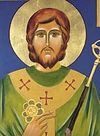

| Previous day | Next day |
| Old Style
March 17
|
Monday |
New Style
March 30
|
|
5th Week of Great Lent.
Tone 8.
Great Lent. |
Monastic rule: xerophagy (bread, uncooked fruits and vegetables).
|
![]() St. Alexis the Man of God, in Rome (411).
St. Alexis the Man of God, in Rome (411). ![]() St. Macarius, founder of Kalyazin Monastery (Tver) (1483).
St. Macarius, founder of Kalyazin Monastery (Tver) (1483).
Martyr Marinus the Soldier, at Caesarea in Palestine (260). St. Patrick, bishop of Armagh and enlightener of Ireland (451). St. Parthenius of the Kiev Caves (1855).
New Hieromartyr Victor Kiranov, archpriest, of Berdyansk (Crimea) (1942).
St. Ambrose, deacon, of Alexandria (400). St. Gertrude, abbess, of Nivelles (659). St. Beccan of Rhum (677). St. Withburga, solitary at Holkham and East Dereham (ca. 743). Monk-martyr Paul of Crete (767). Hieromartyr Gabriel the Lesser, of Gareji, Georgia (1802). St. Gurias, archbishop of Tauria and Simferopol (1882). St. Theosterictus the Confessor, abbot of Pelecete Monastery near Prusa (826).
Repose of Archbishop Tikhon (Troitsky) of San Francisco (1963).
Thoughts for Each Day of the Year
According to the Daily Church Readings from the Word of God
By St. Theophan the Recluse

Monday (the 5th week of Lent).
The eyes of the Lord are in every place, beholding the evil and the good (Prov. 15:3). Oh, if only rational creatures would always keep this in mind! Then not only would they not dare to commit excesses openly and to give themselves over to dissoluteness of the flesh, but also inwardly, in their thoughts, and in the movements of their heart, they would not allow anything unpleasing to God. They would stand then like soldiers at the front before the king, with all attention and strictness toward themselves, that they not be found ignorant of their orders, and not be subject to the king’s wrath and punishment. The orders given to rational creatures are the commandments of God, which determine the proper form of their thoughts, and how their feelings and dispositions ought to be; they would then be quite well-ordered.
Articles
 Martyr MarinusAfter cruel tortures, the saint was beheaded. |







